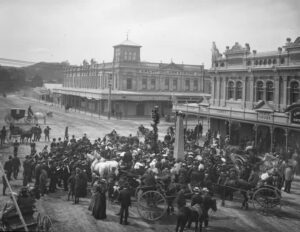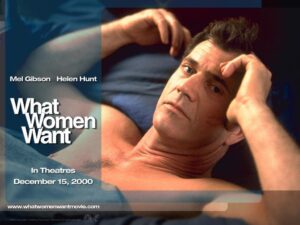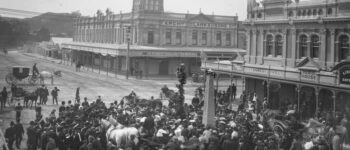1907: Standing in the Sunshine
May 21, 2024
By AHNZ
 What do women want? Well, after Suffragette Margaret Sievwright died they wanted a memorial for her in the middle of Gisborne. It was unveiled on Dominion Day, 26 September, 1907, the day the Colony of New Zealand was rebranded as the Dominion of New Zealand.
What do women want? Well, after Suffragette Margaret Sievwright died they wanted a memorial for her in the middle of Gisborne. It was unveiled on Dominion Day, 26 September, 1907, the day the Colony of New Zealand was rebranded as the Dominion of New Zealand.
According to the photo of the event (left) and the newspaper (Gisborne Times) no vast crowd was attracted. Partly to blame was a great “boisterous gale” carrying dust into everyone’s faces. Sievwright, like all of the exponents of Feminism 1.0, was a wealthy woman with good connections. Her husband had a law partnership with Robert Stout built on their both being Shetland Island Scots. Mrs Stout, of course, was also a great Suffragette of the era. So was Kate Sheppard whose son married Sievwright’s daughter.
This memorial still exists today but has been moved away from the main streets to a park in Fitzherbert Street. Curious to know how much the memorial team attended to the detail of their idol since the inscription incorrectly spells Margaret’s name as “Sievewright” rather than “Sievwright.” Ref. Heritage New Zealand
Not everyone in Gisborne was in favor and I like the letter from E. Joyce to the Poverty Bay Herald. What claim did Mrs Sievwright have over the people of the city that others didn’t? All she ever did was to be an activist which is to say pursue a particular hobby during a time when it was a fad. Specifically, she was one of those Bible-bashing anti-alcohol temperance women who pressured to shut up all the hotels!
As Sievwright herself admitted in 1903 the women’s movement was indeed a passing fad. The fire had gone out of it by the turn of the century and now New Zealanders were indifferent. Still she tried and as recently as 1902 was trying to rekindle it with her ‘Standing in the Sunshine’ speech. The National Council of Women no sooner met in 1896 than they disbanded for 12 years. Ref. 1896: The National Council of Women, AHNZ
Others, like Anna Stout, moved to England where Feminism 1.0 was still burning brightly but had to leave quickly as the movement turned militant and started trying to kill people. Ref. 1914: Frances Parker Arrested, AHNZ
“It certainly is difficult to know what claim Mrs Sievwright has on the public of Gisborne for a public monument m the city, for I am not aware of Mrs Sievwright ever filling any public position except for a short time as member of the Licensing Bench, and all the other members would be as equally entitled to a like recognition. Mrs Sievwright certainly had one hobby, that was to shut up all the hotels. Surely the Borough Council will not be led wrong by such folly…The public thoroughfares are for public matters, and not for private fads, and would it not be better for those who wish to do honor to Mrs Sievwrighi’s memory to place the monument over her last resting place.” – E. P. JOYCE, Poverty Bay Herald (1906,) Papers Past
“By 1903 she realised the fire had gone out of the women’s movement and complained that ‘the apathy and cheerful indifference of the great majority is distinctly benumbing’. She prophesied rightly that it would take a long, hard struggle to rekindle it.” – Elspeth M. Simpson, Dictionary of New Zealand Biography (1993,) Te Ara
“Gisborne women, who first moved m the matter, concluded that it would be more appropriate to have it built in the town in which the deceased lady had lived and died.” – Patriot, Poverty Bay Herald (1906,) Papers Past
“How do you write women so well?” Melvin: “I think of a man. Then I take away reasoning and accountability.” – As Good as It Gets (1997)
“In answer to the oft-asked question, What do women want? she said: “We want men to stand out of our sunshine. That is all. We want to grow as flowers of the field are permitted to grow, whether they be of male or female form. We want to develop as do the mothers of the animal world, where infanticide or female subjection are alike unheard of and undesired. Let woman but have free course and she will glorify not only herself, but the whole race; and in order to her ’having free course our request for woman is only this, that she may have a fair field and no favor, freedom to give expression to her own powers. Our New Zealand University has been thrown open to women on the same terms as men, and nothing : but good has eventuated. Our professions have been thrown open to women, and neither have the skies fallen nor wedding bells ceased to peal. Our polling booths have been thrown open to women, and drunkenness and rowdyism, bribery and corrupt practices have in great measure given place to decency, good order and kindly camaraderie. Let the Civil Service, and other posts, appointments and positions in the colony – or beyond it for that matter – be thrown open to women….We women of the National Council do not pay annual visits to the towns of the colony for our own amusement. There is no royal road to the capacity for real service, as there is no royal road to any supreme attainment,..to put an end to this hell-born conspiracy of silence which is eating into the very vitals of our humanity.’’ – New Zealand Mail (1902,) Papers Past

“Let woman but have free course and she will glorify not only herself, but the whole race”
What women want, according to Sievwright’s group, is for men to get out of their sunshine. It’s a claim for Libertarian liberties also known as Negative Rights. The right to be left alone and not interfered with. It’s the same request that Diogenes made to Alexander the Great. And, the same catch-cry used during Feminism 3.0 for the title of a whole TV series by that name. Ref. Standing in the Sunshine (1993,) NZ on Screen
This was something of a messianic formula for the Feminists because they also had a prophecy for what would happen to New Zealand and the whole world when women got their rights. Or, in other words, when women were accepted as terrestrial angels without sin. They would heal everything they touched, redeem every institution they participated in and become as heaven on earth. Sievwright said votes for women had already done this for our electoral system where “drunkenness and rowdyism, bribery and corrupt practices have in great measure given place to decency, good order and kindly camaraderie.”
Sievwright’s Suffragists were missionaries of this faith which they took into the provinces as their “real service” toward “supreme attainment.” There was no silver bullet, no “royal road,” but lots of sectarian Christian outreach work toward the poor people who disagreed with them; The “ignorant,” she called them. Heathens or Infidels, she probably felt. This was their calling rather than something the National Council did for their own amusement. Humanity, to be saved from having its very vitals eaten out, needed to be wrested from the “hell-born conspiracy” to keep women from fulfilling their divine revelations. The idea that women are divine is never far away from Feminism and in Sievwright’s speech it’s all hidden in plain sight.
 Another of Sievwright’s generation was Annie Schnackenberg who put forth the same view about the messianic character of women. The conceit was that what was wrong with the world was that power had not been in the hands of the incorruptible female. What was best for women (“Soroptimist”) was supposedly best for the world. Institutional reforms in the professions, government, electoral system, civil service etc. wasn’t required at all. All that was required was to let the sacred feminine ghost in, or force it in, and the rest would take care of itself. Ref. 1896: Scientific Temperance Instruction, AHNZ
Another of Sievwright’s generation was Annie Schnackenberg who put forth the same view about the messianic character of women. The conceit was that what was wrong with the world was that power had not been in the hands of the incorruptible female. What was best for women (“Soroptimist”) was supposedly best for the world. Institutional reforms in the professions, government, electoral system, civil service etc. wasn’t required at all. All that was required was to let the sacred feminine ghost in, or force it in, and the rest would take care of itself. Ref. 1896: Scientific Temperance Instruction, AHNZ
By the time Magaret died (1905) this Feminist fad was dying out but certainly there was enough steam left in the old cult to install a monument in the Gisborne CBD.
As history has shown, opening the doors to women did not create a heaven on earth at all. Quite the contrary.
Nor were Sievwright, Schnackenberg, Sheppard, Stout, etc. sincere about the true answer to What Do Women Want? Not simply for men (or “The Patriarchy”) to be expelled and for their Diogenian negative rights! Dig a little deeper than this cover story and we see they didn’t have much faith in their angelic influence but sought to use law and State power to enforce their own preferences. Voting itself was in the service of what women really wanted which was to outlaw hotels and alcohol consumption. They really wanted to force their views into families by controlling what children learned at school.
Sievwright anticipated Robert Briffault’s The Mothers (1927) calling on a naturalistic principle for her argument. In the plant world she noted that there is no sexual discrimination among “flowers of the field.” In the animal world mothers are unregulated and female subjugation and infanticide unheard of, she said. “Let woman but have free course and she will glorify not only herself, but the whole race.” Briffault’s Law states that “The female, not the male, determines all the conditions of the animal family. Where the female can derive no benefit from association with the male, no such association takes place.” Sievwright, like Briffault, noted that mankind had made an exception of this and she wanted us to go back to “nature.” Back to the Garden of Eden, if you will.
It would be fascinating to sit down in conversation with these Victorian ladies to learn what they did really want. There are some damn good reasons why our culture assumed the position of treating men and women differently even though this arrangement is periodically re-negotiated. Briffault made a compelling argument that women did rule the human species for thousands of years but that each culture had, in its turn, staged a Patriarchal overthrow which was still remembered in the legends of many peoples. He also wrote that the maternal role is essential to keeping civilisation from dissolving into a herd. If women try go back to the way plants and animals conduct themselves then the family unit falls away and with it society. “Sex instinct” triumphs over “Mating Instinct.” No wonder if we see the dissolving of gender roles go along with the ending of marriage, monogamy, and the Group Think of the herd.
‘Standing in Sunshine’ is the deification of women and a return to ancient ways. It would be very interesting to know if Sievwright and her sisterhood knew deeply what they were seeking after. Or, were they blind handmaidens of deeper instincts they were never conscious of?
—
Image ref. Unveiling of the Sievwright Memorial, William Fitzgerald Crawford, Gisborne Museum and Arts Centre
Image ref. Standing in the Sunshine (1993,) NZ on Screen
 Like Comment Share
Like Comment Share






One thought on "1907: Standing in the Sunshine"